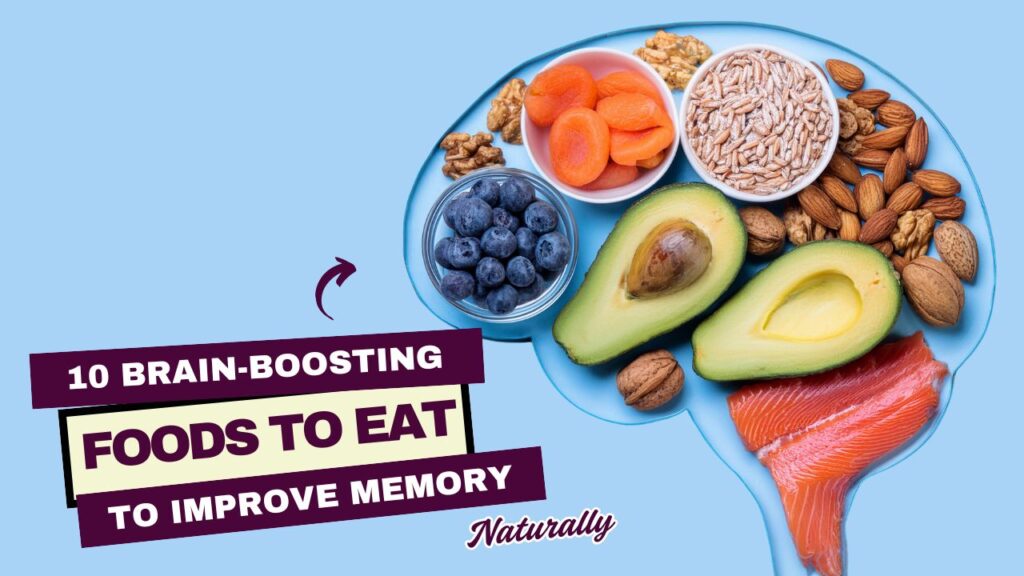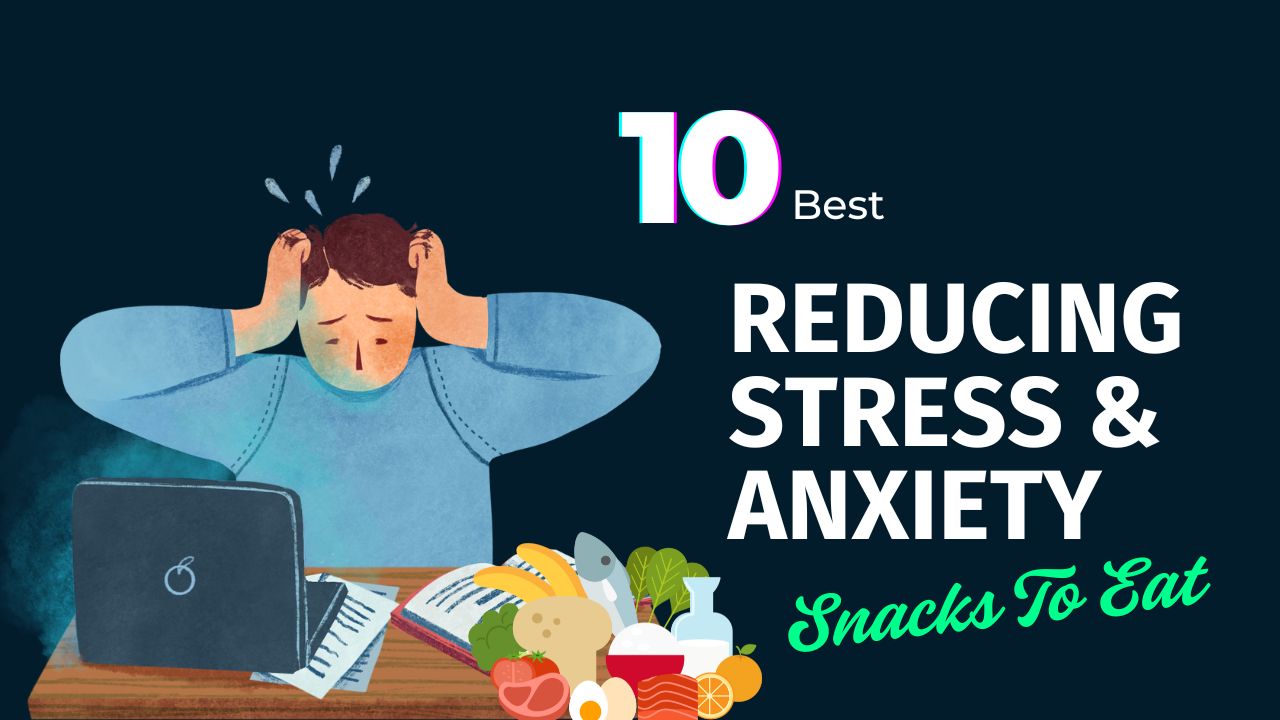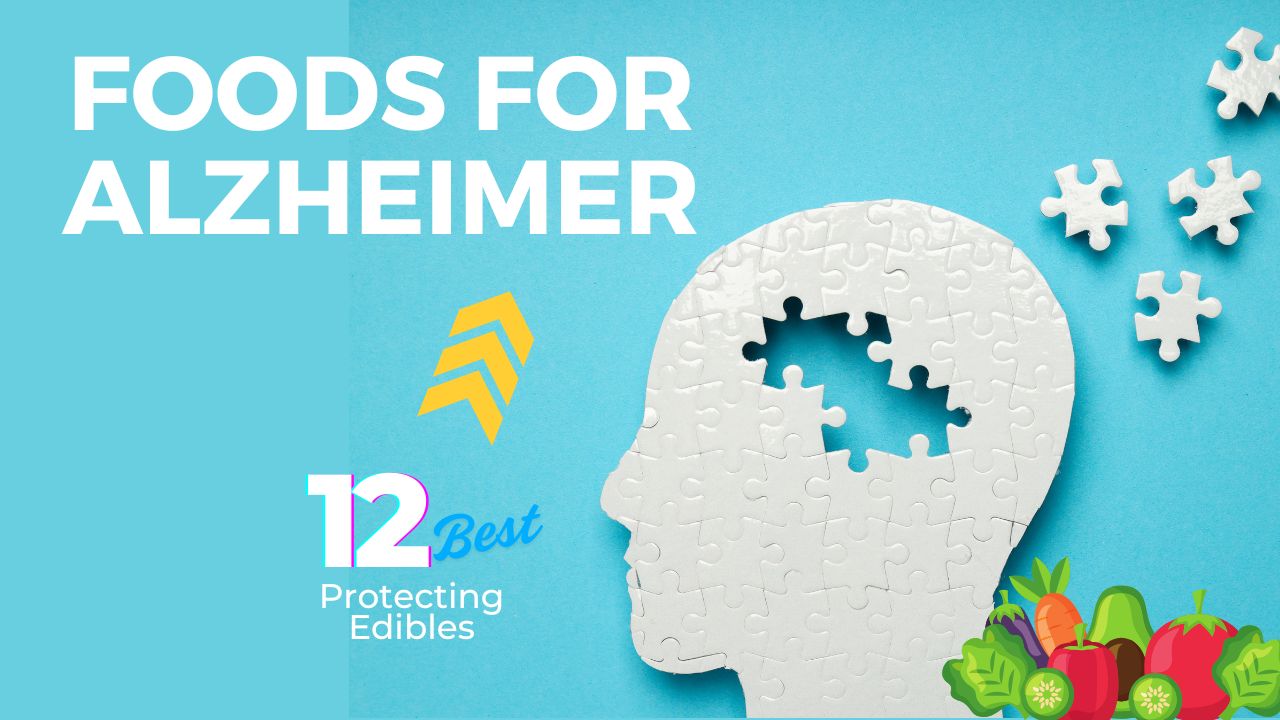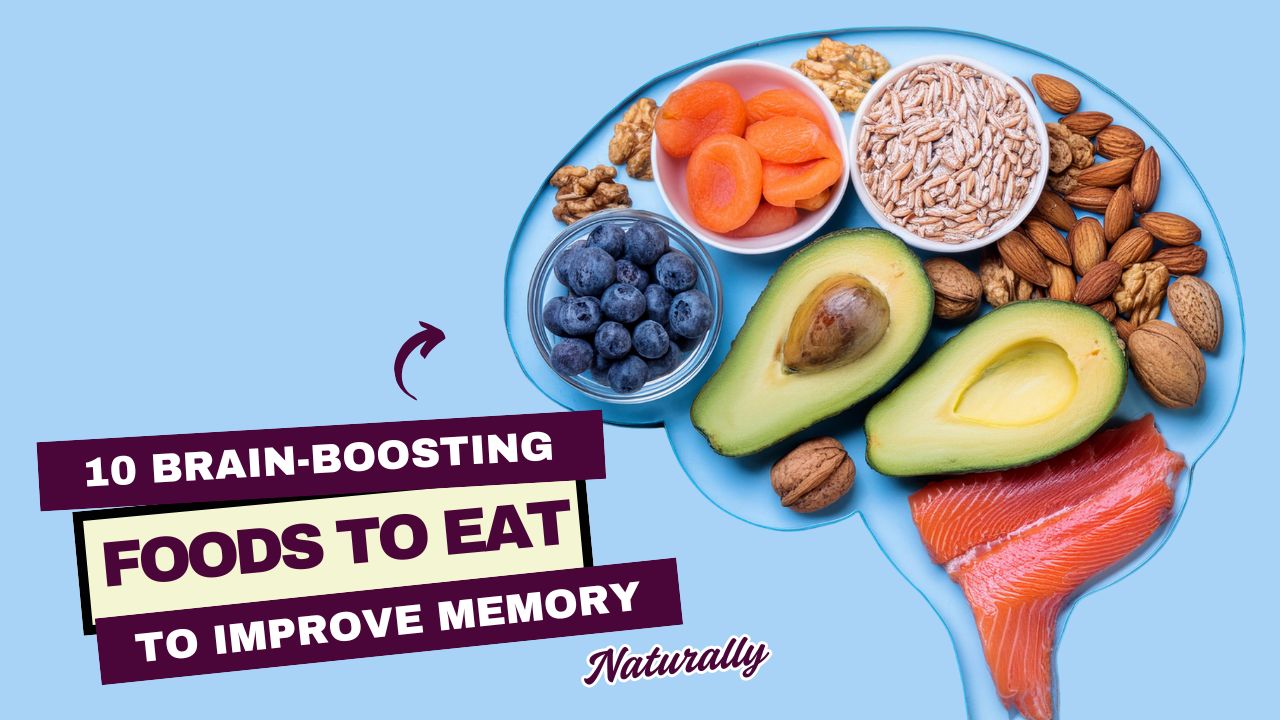Do you often find yourself forgetting simple things like where you placed your keys or the name of a colleague you just met? You’re not alone.
Memory lapses and difficulty concentrating can affect anyone, especially as we age. But what if the solution to sharper memory and better focus lies not in expensive supplements, but in your kitchen?
Research shows that certain foods contain nutrients that support brain health, enhance memory, and even reduce the risk of neurodegenerative diseases.
These aren’t just ordinary foods—they are natural cognitive enhancers that help your brain function at its best.
In this article, we’ll explore 10 brain-boosting foods that can improve memory naturally. For each food, you’ll discover the best ways to eat it, who should include it in their diet, how to store it, and possible side effects. Along the way, we’ll sprinkle in fascinating facts and bust some common myths about brain foods.

Table of Contents
Top 10 Foods To Improve Memory
1. Blueberries
Why They Boost Memory
Blueberries are packed with antioxidants called flavonoids, which help fight inflammation and oxidative stress in the brain. Studies suggest that regular blueberry consumption can improve short-term memory and delay brain aging.
Best Ways to Eat or Use It
- Eat raw as a snack.
- Add to smoothies or oatmeal.
- Mix into yogurt or salads.
- Freeze for smoothies to retain nutrients.
Tip: Pairing blueberries with vitamin C-rich fruits like oranges can enhance antioxidant absorption.
Who Should Eat / Avoid
- Good for: Students, seniors, anyone looking to improve cognitive function.
- Avoid if: Rare berry allergies.
Storage & Buying Tips
- Choose firm, plump berries with a deep blue color.
- Store in the refrigerator in a breathable container.
- Wash just before eating to prevent spoilage.
Do’s & Don’ts
| ✅ Do | ❌ Don’t |
|---|---|
| Eat fresh or frozen | Rely solely on supplements |
| Combine with vitamin C foods | Leave unrefrigerated for days |
Possible Side Effects
Rare allergic reactions. Overconsumption may cause mild digestive issues.
2. Walnuts
Why They Boost Memory
Walnuts are rich in DHA, a type of Omega-3 fatty acid critical for brain function. DHA supports cognitive performance and may reduce the risk of Alzheimer’s. Fun fact: studies suggest that just a handful of walnuts a day can help improve memory and focus.
Best Ways to Eat or Use It
- Raw or roasted as a snack.
- Sprinkle on salads or cereals.
- Blend into smoothies or nut butter.
Tip: Avoid high-heat roasting as it can damage healthy fats.
Who Should Eat / Avoid
- Good for: Pregnant women (supports fetal brain development), students, professionals.
- Avoid if: Nut allergies, those on strict low-fat diets.
Storage & Buying Tips
- Choose walnuts with a light brown shell and no musty smell.
- Store in an airtight container in the fridge or freezer.
Do’s & Don’ts
| ✅ Do | ❌ Don’t |
|---|---|
| Eat raw or lightly roasted | Overconsume (high-calorie food) |
| Combine with fruits | Store in warm places |
Possible Side Effects
May cause allergic reactions in sensitive individuals.
3. Dark Chocolate
Why They Boost Memory
Dark chocolate contains flavonoids and caffeine, which can enhance brain plasticity, improve memory, and increase blood flow to the brain. Interestingly, studies show that dark chocolate can boost short-term memory and even improve problem-solving skills.
Best Ways to Eat or Use It
- Enjoy a small square (70% cacao or higher) daily.
- Melt into smoothies or drizzle over fruit.
- Add to oatmeal or energy bars.
Tip: Pair dark chocolate with nuts or berries for a synergistic brain-boosting effect.
Who Should Eat / Avoid
- Good for: Adults seeking improved focus or cognitive function.
- Avoid if: Individuals sensitive to caffeine or prone to migraines.
Storage & Buying Tips
- Buy chocolate with high cacao content (70%+).
- Store in a cool, dry place away from sunlight.
Do’s & Don’ts
| ✅ Do | ❌ Don’t |
|---|---|
| Eat in moderation | Choose chocolate with high sugar |
| Combine with nuts/berries | Overconsume daily |
Possible Side Effects
Excessive consumption can lead to caffeine jitters, headaches, or digestive discomfort.
4. Fatty Fish
Why They Boost Memory
Fatty fish like salmon, sardines, and mackerel are rich in Omega-3 fatty acids, especially DHA, which supports brain structure and memory. Regular consumption is linked to slower cognitive decline and improved learning ability.
Best Ways to Eat or Use It
- Grill, bake, or steam.
- Use in salads or sandwiches.
- Incorporate in sushi or poke bowls.
Tip: Eating fatty fish twice a week can significantly benefit memory and mood.
Who Should Eat / Avoid
- Good for: Pregnant women, seniors, anyone wanting brain protection.
- Avoid if: Allergic to fish or have mercury sensitivity (limit large predatory fish).
Storage & Buying Tips
- Buy fresh, firm, shiny fish with a mild scent.
- Store in the coldest part of the fridge and consume within 1-2 days.
Do’s & Don’ts
| ✅ Do | ❌ Don’t |
|---|---|
| Eat 2x per week | Overcook (reduces nutrients) |
| Choose wild-caught fish | Buy fish with off-smell |
Possible Side Effects
Mercury exposure in large predatory fish. Rare fish allergies.
5. Broccoli
Why They Boost Memory
Broccoli contains antioxidants and vitamin K, which plays a role in forming sphingolipids—essential fats in brain cell membranes. Fun fact: vitamin K deficiency can affect cognitive function and memory over time.
Best Ways to Eat or Use It
- Steam lightly to retain nutrients.
- Add raw to salads or slaws.
- Stir-fry or roast with olive oil.
Tip: Pair broccoli with healthy fats like olive oil or avocado to maximize vitamin K absorption.
Who Should Eat / Avoid
- Good for: Everyone, especially adults and seniors.
- Avoid if: Rare sensitivity to cruciferous vegetables.
Storage & Buying Tips
- Select firm, dark-green florets.
- Store in perforated bags in the fridge.
- Use within 3-5 days for best quality.
Do’s & Don’ts
| ✅ Do | ❌ Don’t |
|---|---|
| Steam or lightly cook | Boil for too long |
| Combine with healthy fats | Store at room temperature |
Possible Side Effects
May cause bloating or gas in sensitive individuals.
6. Pumpkin Seeds
Why They Boost Memory
Pumpkin seeds are rich in magnesium, iron, zinc, and copper—all minerals vital for brain health. Zinc, in particular, supports nerve signaling and memory.
Best Ways to Eat or Use It
- Eat raw or roasted as a snack.
- Sprinkle on yogurt, salads, or oatmeal.
- Blend into smoothies or nut butter.
Tip: Light roasting enhances flavor but keep temperature low to preserve nutrients.
Who Should Eat / Avoid
- Good for: Students, athletes, anyone needing mental energy.
- Avoid if: Allergic to seeds.
Storage & Buying Tips
- Buy raw, unsalted seeds.
- Store in airtight containers in a cool, dark place.
Do’s & Don’ts
| ✅ Do | ❌ Don’t |
|---|---|
| Eat raw or lightly roasted | Over-salt |
| Combine with fruits/nuts | Buy pre-roasted with oils |
Possible Side Effects
Excess consumption can cause mild digestive discomfort.
7. Oranges
Why They Boost Memory
Oranges are high in vitamin C, a powerful antioxidant that protects brain cells from free radical damage. Studies suggest vitamin C can improve mental agility and memory.
Best Ways to Eat or Use It
- Eat fresh as a snack.
- Add to salads or desserts.
- Juice, but consume immediately to retain nutrients.
Tip: Don’t peel too early; vitamin C can degrade if exposed to air for long.
Who Should Eat / Avoid
- Good for: Everyone, especially older adults and students.
- Avoid if: Acid reflux or citrus allergies.
Storage & Buying Tips
- Choose firm, heavy oranges with smooth skin.
- Store at room temperature for a few days or in the fridge for up to two weeks.
Do’s & Don’ts
| ✅ Do | ❌ Don’t |
|---|---|
| Eat fresh daily | Store too long at room temp |
| Pair with healthy fats | Drink too much juice (high sugar) |
Possible Side Effects
May worsen acid reflux in sensitive people.
8. Eggs
Why They Boost Memory
Eggs are rich in choline, a nutrient essential for neurotransmitter production and brain development. Choline deficiency is linked to memory problems and cognitive decline.
Best Ways to Eat or Use It
- Boiled, poached, or scrambled.
- Add to salads, sandwiches, or grain bowls.
- Use in omelets with vegetables.
Tip: Cooking eggs lightly preserves choline and antioxidants.
Who Should Eat / Avoid
- Good for: Students, seniors, pregnant women.
- Avoid if: Egg allergy or high cholesterol concerns.
Storage & Buying Tips
- Buy fresh eggs with clean, uncracked shells.
- Store in the coldest part of the fridge.
Do’s & Don’ts
| ✅ Do | ❌ Don’t |
|---|---|
| Eat boiled or lightly cooked | Fry excessively in oil |
| Pair with vegetables | Store unrefrigerated |
Possible Side Effects
Rare allergic reactions. Overconsumption may affect cholesterol in sensitive individuals.
9. Green Tea
Why They Boost Memory
Green tea contains caffeine and L-theanine, which improve brain function, alertness, and memory. Studies show that these compounds work synergistically to enhance cognitive performance.
Best Ways to Eat or Use It
- Brew fresh leaves and drink warm.
- Use as a base for smoothies or matcha lattes.
Tip: Avoid boiling water directly over leaves; use 70–80°C water to retain antioxidants.
Who Should Eat / Avoid
- Good for: Adults seeking mental clarity and memory support.
- Avoid if: Sensitive to caffeine, pregnant women (limit intake).
Storage & Buying Tips
- Buy high-quality loose leaves or matcha powder.
- Store in airtight containers away from light and moisture.
Do’s & Don’ts
| ✅ Do | ❌ Don’t |
|---|---|
| Drink fresh | Use old or stale leaves |
| Pair with lemon | Add too much sugar |
Possible Side Effects
Excess caffeine may cause jitters, insomnia, or headaches.
10. Turmeric
Why They Boost Memory
Turmeric contains curcumin, which has anti-inflammatory and antioxidant properties. Curcumin may help improve memory, reduce cognitive decline, and support overall brain health.
Best Ways to Eat or Use It
- Add to curries, soups, or rice dishes.
- Mix with warm milk for a “golden latte.”
- Combine with black pepper to enhance absorption.
Tip: Pair turmeric with fats and black pepper to maximize curcumin absorption.
Who Should Eat / Avoid
- Good for: Adults looking to prevent memory decline.
- Avoid if: Gallbladder issues or turmeric allergy.
Storage & Buying Tips
- Buy fresh or high-quality dried turmeric powder.
- Store in airtight containers in a cool, dark place.
Do’s & Don’ts
| ✅ Do | ❌ Don’t |
|---|---|
| Use with black pepper | Overuse in raw form |
| Combine with healthy fats | Store in sunlight |
Possible Side Effects
High doses may cause stomach upset or interact with certain medications.
Conclusion
Incorporating these 10 brain-boosting foods into your diet can improve memory, enhance focus, and support long-term cognitive health.
From antioxidant-rich blueberries and vitamin-packed oranges to Omega-3 fatty acids in fatty fish and walnuts, nature provides a variety of ways to fuel your brain.
Try adding one or two of these foods to your meals today and notice how your mental clarity and memory improve over time.
Frequently Asked Questions (FAQs)
Can eating these foods really improve memory?
Yes! Many of these foods are rich in antioxidants, Omega-3 fatty acids, vitamins, and minerals that support brain function, improve focus, and may reduce cognitive decline over time.
How often should I eat brain-boosting foods?
For best results, incorporate a variety of these foods into your daily diet. For example, fruits like blueberries or oranges can be eaten daily, while fatty fish is recommended 2–3 times per week.
Are supplements as effective as these foods?
Whole foods provide a combination of nutrients and antioxidants that supplements may not fully replicate. While supplements can help in certain cases, natural foods are usually more effective for long-term brain health.
Can children eat these foods for better memory?
Yes! Foods like eggs, blueberries, walnuts, and pumpkin seeds are safe and beneficial for children, supporting brain development and improving learning ability.
Are there any side effects of eating these brain foods?
Most of these foods are safe when eaten in moderation. However, some may cause allergies (nuts, eggs), digestive issues (broccoli, pumpkin seeds), or interact with medications (turmeric, green tea).
How soon can I notice improvements in memory?
Results vary depending on your diet, lifestyle, and age. Some people notice subtle improvements in focus and clarity within weeks, while long-term benefits for memory may take months.
Can these foods prevent Alzheimer’s or dementia?
While these foods support brain health and may reduce the risk of cognitive decline, they are not a guaranteed prevention for Alzheimer’s or dementia. A balanced diet, regular exercise, and healthy lifestyle are key factors.
Should I combine these foods for better results?
Yes! Combining antioxidant-rich foods with healthy fats (like blueberries with walnuts) or pairing turmeric with black pepper and fats can enhance nutrient absorption and maximize brain benefits.
Are frozen fruits as good as fresh ones?
Frozen fruits like blueberries are usually just as nutritious as fresh ones because they are picked and frozen at peak ripeness, preserving most of their vitamins and antioxidants.
Can I eat these foods if I have dietary restrictions?
Many of these foods can be adapted to special diets, but check individual restrictions. For example, those with nut allergies should avoid walnuts, and people sensitive to caffeine should limit dark chocolate and green tea.










